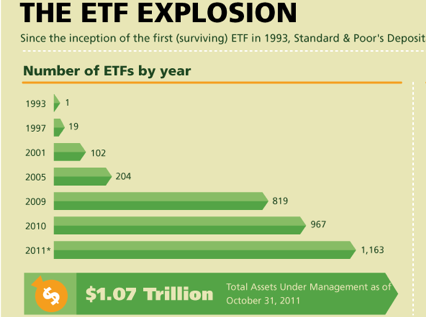What is an ETF
Post on: 15 Июль, 2015 No Comment

What are ETFs?
What is an ETF?
Exchange Traded Funds (ETFs) are the middle children of stock trading. They follow their big brother, Index, up, down and all around, but they act more like their little brother, Equity.
How ETFs are Like an Index
An equity index is a collection of stocks with a common theme representing an industry. For example, the Oil Index (OSX) is a compilation of shares from various oil companies. That collection of shares is commonly known as a basket.
In order to purchase shares in the OSX, you would need to by a few hundred shares of about 15 different stocks. Sometimes that makes trading the OSX at a certain price very difficult. Stocks tend to move. Also, the commissions on all those buys add up.
These factors led to the creation of an ETF. An Exchange Traded Fund is an index-based investment (or sometimes other underlying asset) whose performance is based on its correlating index. For example, the OIH is an oil ETF that follows the OSX oil Index. It is a mini-portfolio of oil industry equities. Therefore, if the OSX is up, generally so is the OIH, and vice versa.
Keep in mind that while an ETF is similar to its underlying index, its purpose is not to outperform the index, but rather to mimic the index. The goal of an ETF is to yield the same return on investment (ROI) as its correlating index. However, there are exceptions to this rule as is the case with leveraged ETFs and inverse ETFs.
How ETFs are Like an Equity
The good news about an ETF is that you don’t have to purchase a basket of equities in order to acquire shares of an ETF. Like an equity, you bid one price for one investment.
If you want to buy the OIH at $88.75, then you buy the OIH at $88.75 (if it is trading there, of course). You don’t have to buy shares of 15 different stocks and hope you come close to the desired price. Trying to hit a target price when purchasing an index can get tricky.
How ETFs are Not Like Indexes or Equities
When you buy or sell a stock, you are basing your transaction on the predicted performance of one company. When you buy or sell an ETF. you are basing your transaction on the predicted performance of multiple companies. Sometimes, that can be difficult.
When you buy or sell an index, you are actually buying shares in individual companies. With an ETF, you are buying shares in a portfolio of those companies. So, if you had an opinion about a certain company in the index basket, you could make an adjustment by selling or buying shares of an individual equity (although, this is not common). With an ETF, you cannot adjust the individual equities in the portfolio.
How ETFs are Like Indexes and Equities
Like indexes and equities, ETFs are traded on an exchange and during market hours. Some ETFs list derivatives and futures contracts. They can also be sold short or margined.
How ETFs are Like an ETF
It seems like ETFs are the best of both worlds. However, while there are many advantages. there are disadvantages as well. But overall, including ETFs in your portfolio can help you both hedge risk, as well as create investment opportunities. It just may be time for you to get started with ETFs .
If you are new to ETFs, I strongly recommend checking some of the following material to see if ETFs are right for you.














